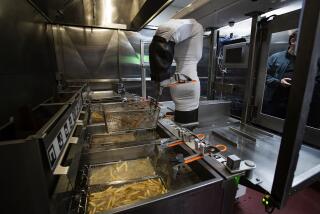Producing more babies via automation
- Share via
In vitro fertilization success rates have been stuck in the mid-30% range for many years. But researchers in the United Kingdom have found they can improve the odds of pregnancy by more than a quarter by using automated equipment for growing embryos.
After eggs and sperm are united in a culture dish, the cultures are incubated for several days. Lab personnel have to monitor the growth of the embryos, which requires periodically removing them from incubators. The embryos that look healthiest are chosen for transfer into the patient. Nevertheless, only about one-third of women become pregnant.
A team from Newcastle Fertility Centre at Life created a system in which embryo growth can be monitored without having to remove the cultures from the incubator. In the incubator, the embryos are kept at a constant temperature and in controlled air quality. Using the automated process, a greater proportion of the embryos developed normally.
Moreover, when these embryos were transferred, pregnancy rates increased to 45% -- a significant jump from 32% and 35% in the clinic’s preceding two years.
The automated incubation design appears to more naturally mimic conditions in the womb, said the lead author of the study, Dr. Mary Herbert, a professor of reproductive biology. In the United States, about 1% of all births are due to IVF.
The study appears online Wednesday in the journal PLoS One.
Follow me: twitter.com/LATShariRoan






